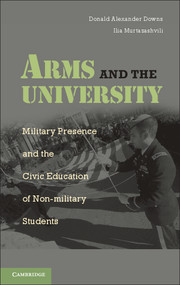1 - Introduction
The Closing of the University Mind: The Military–University Gap and the Problem of Civic and Liberal Education
Published online by Cambridge University Press: 05 June 2012
Summary
War is an ugly thing, but not the ugliest of things. The decayed and degraded state of moral and patriotic feeling which thinks that nothing is worth war is much worse. The person who has nothing for which he is willing to fight, nothing which is more important than his own personal safety, is a miserable creature and has no chance of being free unless made and kept so by the exertions of better men than himself.
– John Stuart MillThe progress of our arms, upon which all else chiefly depends, is as well known to the public as to myself, and it is, I trust, reasonably satisfactory and encouraging to all. . . . Both parties deprecated war, but one of them would make war rather than let the nation survive, and the other would accept war rather than let it perish, and the war came.
– President Abraham LincolnThe inspiration for this book arose several years before either of us actually sat down to begin the research that led to its publication. It was born when we observed events that took place on American campuses in the immediate aftermath of al Qaeda’s terrorist attacks on September 11, 2001. Most of the campus ceremonies and “teach-ins” addressing the attacks that we read about in the press emphasized such things as counseling students to resist the impulse to fight back and to think hard about why America was responsible for bringing this action upon itself. Various versions of pacifism were espoused on many occasions. A ceremony on our own campus in Madison, Wisconsin, that drew an estimated twenty thousand witnesses on September 14 fit this pattern to a “T.” Along with many of our colleagues, we understood and appreciated these remarks, but we also felt that something was missing.
- Type
- Chapter
- Information
- Arms and the UniversityMilitary Presence and the Civic Education of Non-Military Students, pp. 3 - 39Publisher: Cambridge University PressPrint publication year: 2012



